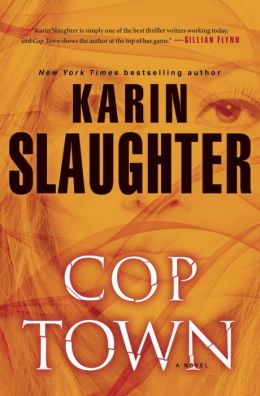What makes a good thriller stand out from the pack? Most thrillers have a good plot, so it’s not just plot. To my mind it’s specificity. Karin Slaughter’s writing has always had this in spades. She has great narrative skills, wonderful characters, and she always makes her stories very specific. In Cop Town two things make the story pop: the time period, 1974, and the place, a very gritty and authentic Atlanta.
This is a story about cops.
The Lawson family boasts two: golden boy Jimmy, who opens the story carrying his soon-to-be-dead partner on his back to the hospital; and Maggie, one of the first female cops in a male-centric and very sexist system. The women on the force are relegated to a tiny dressing room with no bathroom; they aren’t allowed on the big cases or promoted to detectives; and they are treated, in every way, like pieces of meat by the men on the squad.
Thrown into this mix is raw recruit Kate Murphy, the widow of a Vietnam vet who comes from, as far as cops are concerned, the wrong side of the tracks. Her family is both wealthy and Jewish. She turns up on her first day in the too-big uniform they’ve assigned her, she’s fondled by the men on the way in, and razzed by the women in the locker room. Initially, Jimmy is assigned as Kate’s partner on what becomes the most terrible day of his own life but, by a turn of events, Kate ends up with Maggie as her partner instead as she’s thrown into the fire her first day out.
Everyone is assuming Jimmy’s partner was killed by the “Shooter” who has already killed six cops. The police force is out for blood and they are not interested in newbies and especially not in newbie women. Slaughter’s telling of what is basically a gripping serial killer story—complete with a first-person insight into the mind of the killer—is fleshed out and made meaningful by her larger thematic concerns of how women adapted to this particular workplace and the resistance and hostility of the men who were seeing the world change around them, despite their best efforts to prevent it.
Within that broader concern—again, Slaughter is specific—she’s interested in the ways people can adapt and demonstrate not just two faces to the world, but many more. Obviously the killer does this, but as the story goes on, Kate begins to assume different personas. She’s a different woman in a shootout, for example, than when she’s talking to her grandmother—and more specifically, she asks her grandmother, “How can awful people be good?”
Her grandmother’s response alone makes reading the book worthwhile, but you can also enjoy this wonderful book on the merits of its storytelling power. It has many sides, just like Kate Murphy.



